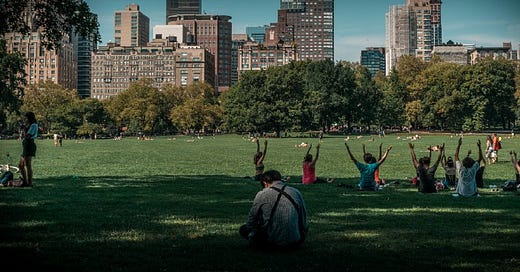Why America Must Rethink Public Goods
The COVID-19 pandemic has made clear the folly of four decades of disinvestment in shared resources.

Photo by Alex Simpson on Unsplash
I didn’t write last week, and I was barely able to write this week. The worldwide COVID-19 pandemic has become so all-pervasive, it’s tough to think about anything else.
It’s especially tough to think about the future of cities when we have no idea what sort of future we will emerge into when the worst of this is over. It’s certain that our cities will endure, though, I’m reminded, as Richard Florida noted on Twitter, “Our cities have been reshaped and re-designed by previous health crises.”
What that reshaping and redesigning will look like, however, is not a question I’m going to tackle today. I want to write about something much more basic, and do so briefly so as not to take up too much of your time when you have bigger things to worry about.
I think what we’re seeing is the folly of forty years of mass privatization and disinvestment in public goods. As state and national leaders have stripped our shared societal goods down in reckless pursuit of tax cuts and profits for corporations and the wealthy, ordinary people were left vulnerable to exactly what we’re seeing play out now across the country as a result of the pandemic.
It’s basically the ethos of rugged individualism of American frontier times bastardized by Reaganomics and weaponized by today’s Republican Party.

Photo by Priscilla Du Preez on Unsplash
I mean by public goods the things we all share in providing for our society. Right now, we’re seeing how disinvestment and privatization effects our health in the form of brick and mortar hospital facilities, medical equipment and supplies, and healthcare insurance being tied to employment. What you end up with is a society-wide inability to deal with a large-scale problem.
As tax rates fall, public coffers thin out, and we’re left with the cold, exploitative economy and self-obsessed culture of today’s America. The rich get richer, and regular people fend for themselves at the expense of community. You can see it every day on the empty shelves of grocery stores where people stockpile hand sanitizer and toilet paper for themselves, everyone else be damned, while the mega-wealthy isolate themselves on yachts.
From a community-building perspective, there are public goods the immense worth of which we are being reminded of by the disruptions of the pandemic. I won’t prattle on too long, but I wanted to point out a few which have proven to have been undervalued and underinvested in, in the hopes that whenever in the future we emerge from this crisis, we will perhaps do so with changed attitudes towards what we are willing to share in building for the common good.
One of the enduring images of this crisis, when we look back upon it years from now, will be the simple act of going outside for a walk or a run or a bike ride. Basic pedestrian infrastructure, so long ignored, is now one of the most important public goods we have. Sidewalks, bike lanes and paths, and public parks are providing a much-needed reprieve for so many of of us amid the monotony of sheltering in place.
Yet not everyone has access to these seemingly mundane amenities, and even more only to inadequate, underfunded, or crumbling versions. This is a simple example of our lack of public goods, but it’s illustrative of my larger point.

Photo by Julia Stepper on Unsplash
When another stimulus bill comes before Congress, I would advocate for more simple investments such as these, rather than creating bailouts for corporations and ignoring the perils being faced by common everyday folks.
There are so many other numerous examples of valuable public goods that we’re being reminded of now in addition to healthcare and pedestrian infrastructure. Public transportation, public media, retirement, childcare, unemployment, basic shelter and nutrition; each of these things can be a public good if we so choose to invest in them, and the lessons of the novel coronavirus outbreak suggests that we should.
Perhaps this current crisis can serve as a turning point, if we rise above those “leaders” who are already attempting to use it for nefarious gains. Scott Hines makes this point eloquently in his excellent Action Cookbook Newsletter, and I can think of no better idea with which to leave off this week:
[I]t’s possible that we’ll look back on this moment as an inflection point in our social history. The cruelty, inequity, and simple unsustainability of so many things we take for granted is being exposed right now, and it’s going to get worse before it gets better. We’re faced with a reckoning about what we consider essential — both in our own daily actions and in the people we don’t often realize or admit we are relying on. Our shared duty to one another is being made starkly more apparent not just as an issue of morality but of collective survival.
Please stay safe, everyone.
Thanks for reading!
If you like this newsletter and want to support it, forward it to someone who’d like it.
If you’re seeing this newsletter for the first time, you can subscribe here.
If you’re a Medium subscriber, you can read the post there, which potentially kicks a little cash my way.



